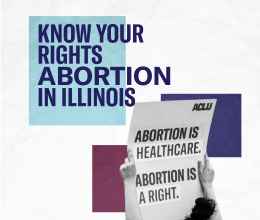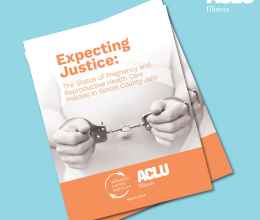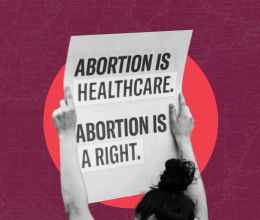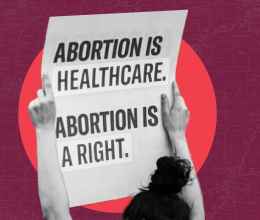What does the Reproductive Health Act (RHA) do?
The RHA gives each person a fundamental right to make individual decisions about their own reproductive health. This includes the fundamental right to use or refuse reproductive health care, including contraception (i.e. birth control), sterilization, abortion, birthing decisions, and maternity care.
- What does it mean to have a “fundamental right”? A fundamental right is one that the government cannot interfere with except in certain narrow situations. Under the RHA, a person can sue the State of Illinois or local governments like cities and counties if they improperly deny, interfere with, or discriminate against the person’s fundamental rights to make their own reproductive health decisions.
- What type of reproductive health decisions are protected? The RHA protects all individual decision-making in the area of reproductive health. This includes decisions about reproductive health care, like:
- Deciding to use or refuse contraception (birth control) or sterilization.
- Deciding what type of birth control to use, if any.
- If pregnant, deciding whether to give birth or have an abortion.
- Making health care decisions about preventing pregnancy, terminating pregnancy, managing pregnancy loss, or how to improve maternal health or birth outcomes.
- When giving birth, making decisions like whether to have an induction, epidural anesthesia, or cesarean surgery.
- Are there any limits on when medical professionals can perform abortions in Illinois? Health care professionals who provide abortion care must follow the accepted standards of clinical practice. If a health care professional finds that a fetus is viable, they may only perform an abortion when necessary to protect the patient’s life or health (including both physical and emotional health). These decisions depend on each pregnant person’s specific circumstances and the health care professional’s professional judgment, based on accepted standards of clinical practice.
- Can a pregnant person be punished for doing something that could harm their pregnancy? The RHA says that the government cannot prosecute or punish a person for something that they either did or did not do during their pregnancy just because of the harmful impact the government claims this has had or will have on either the pregnancy or the pregnant person’s own health.
- Does the RHA apply to health care providers with religious objections to providing abortion or birth control? The RHA does not change the existing Illinois law (the Health Care Right of Conscience Act) that permits health care providers to refuse to provide services to which they have religious objections. The Health Care Right of Conscience Act lets providers refuse to offer these services as long as they follow protocols to ensure that patients are given all relevant information to access the care they need.
The RHA requires that the government treat abortion, contraception and maternal care like all health care, with regulations that reflect current medical standards.
- What does it mean to treat reproductive health care like all other health care? The RHA requires that types of reproductive health care are not singled out for special restrictions where there is not a good medical reason for it. For example, some states require all abortions to be performed in facilities that are mini-hospitals, even though there is no medical reason for it and abortions are very safe procedures. The RHA removed language from Illinois law that would single out abortion for unfair treatment. If the government creates special requirements that limit people’s ability to make reproductive health decisions or their access to reproductive health care like abortion, birth control, or maternity care, it could be sued in court and required to show compelling evidence to justify the requirement.
The RHA requires private health insurance plans in Illinois to cover abortion like they do other pregnancy related care.
- What does this abortion coverage requirement in the RHA mean? If a private health-insurance policy covers pregnancy-related care, then it must also cover the costs of abortion. Any deductible, coinsurance, waiting period, or other cost-sharing limit that applies to abortion cannot be higher than what the policy requires for other pregnancy care. A policy cannot otherwise impose any restriction or delay on coverage for abortion.
- Does the insurance coverage requirement apply to all insurance policies? No. It only applies to individual and group accident or health insurance policies that cover pregnancy-related care. If your insurance is through an Illinois state, county, or city employee plan, abortion should be covered. Certain categories of insurance plans, such as some multi-state plans, are not required to cover abortion.
- Does the RHA require employers with conscience objections to pay for abortion coverage in health insurance plans? The RHA does not change the protections that already exist in Illinois law (under the Health Care Right of Conscience Act) for those with moral or religious objections, including organizations that pay for health care insurance, who want to opt out of coverage and have a documented conscience-based objection.
Other frequently asked questions:
- Does the RHA cover nonresidents? The RHA generally applies to all persons in Illinois and to reproductive health care services provided in Illinois, including when residents of other states receive care in Illinois. However, the insurance coverage requirement in the bill only applies to health insurance plans that are issued in Illinois.
- When did the RHA go into effect? The RHA went into effect on June 12, 2019. The insurance coverage requirement applies to policies that are issued, amended, delivered, or renewed in Illinois after June 12, 2019.
- Did the RHA repeal parental notification of abortion for minors? No. When the RHA was introduced in 2019, a separate bill was also introduced to repeal the Illinois law that requires parental notification for minors who are seeking an abortion. That separate parental notice repeal bill did not pass out of the General Assembly that session, but the parental notice law was subsequently repealed by a bill that went into effect in June of 2022.
- If state or local government interferes with or discriminates against my right to make decisions about my reproductive health, who can I contact? If you have questions or concerns about whether your rights protected by the RHA have been violated, share your story with us on the ACLU of Illinois website here.





